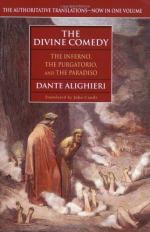We through the broken rock ascended, close
Pent on each side, while underneath the ground
Ask’d help of hands and feet. When we
arriv’d
Near on the highest ridge of the steep bank,
Where the plain level open’d I exclaim’d,
“O master! say which way can we proceed?”
He answer’d, “Let no step of thine recede.
Behind me gain the mountain, till to us
Some practis’d guide appear.” That
eminence
Was lofty that no eye might reach its point,
And the side proudly rising, more than line
From the mid quadrant to the centre drawn.
I wearied thus began: “Parent belov’d!
Turn, and behold how I remain alone,
If thou stay not.”—” My son!”
He straight reply’d,
“Thus far put forth thy strength;” and
to a track
Pointed, that, on this side projecting, round
Circles the hill. His words so spurr’d
me on,
That I behind him clamb’ring, forc’d myself,
Till my feet press’d the circuit plain beneath.
There both together seated, turn’d we round
To eastward, whence was our ascent: and oft
Many beside have with delight look’d back.
First on the nether shores I turn’d my eyes,
Then rais’d them to the sun, and wond’ring
mark’d
That from the left it smote us. Soon perceiv’d
That Poet sage now at the car of light
Amaz’d I stood, where ’twixt us and the
north
Its course it enter’d. Whence he thus
to me:
“Were Leda’s offspring now in company
Of that broad mirror, that high up and low
Imparts his light beneath, thou might’st behold
The ruddy zodiac nearer to the bears
Wheel, if its ancient course it not forsook.
How that may be if thou would’st think; within
Pond’ring, imagine Sion with this mount
Plac’d on the earth, so that to both be one
Horizon, and two hemispheres apart,
Where lies the path that Phaeton ill knew
To guide his erring chariot: thou wilt see
How of necessity by this on one
He passes, while by that on the’ other side,
If with clear view shine intellect attend.”
“Of truth, kind teacher!” I exclaim’d,
“so clear
Aught saw I never, as I now discern
Where seem’d my ken to fail, that the mid orb
Of the supernal motion (which in terms
Of art is called the Equator, and remains
Ever between the sun and winter) for the cause
Thou hast assign’d, from hence toward the north
Departs, when those who in the Hebrew land
Inhabit, see it tow’rds the warmer part.
But if it please thee, I would gladly know,
How far we have to journey: for the hill
Mounts higher, than this sight of mine can mount.”
He thus to me: “Such is this steep ascent,
That it is ever difficult at first,
But, more a man proceeds, less evil grows.
When pleasant it shall seem to thee, so much
That upward going shall be easy to thee.
As in a vessel to go down the tide,
Then of this path thou wilt have reach’d the
end.




